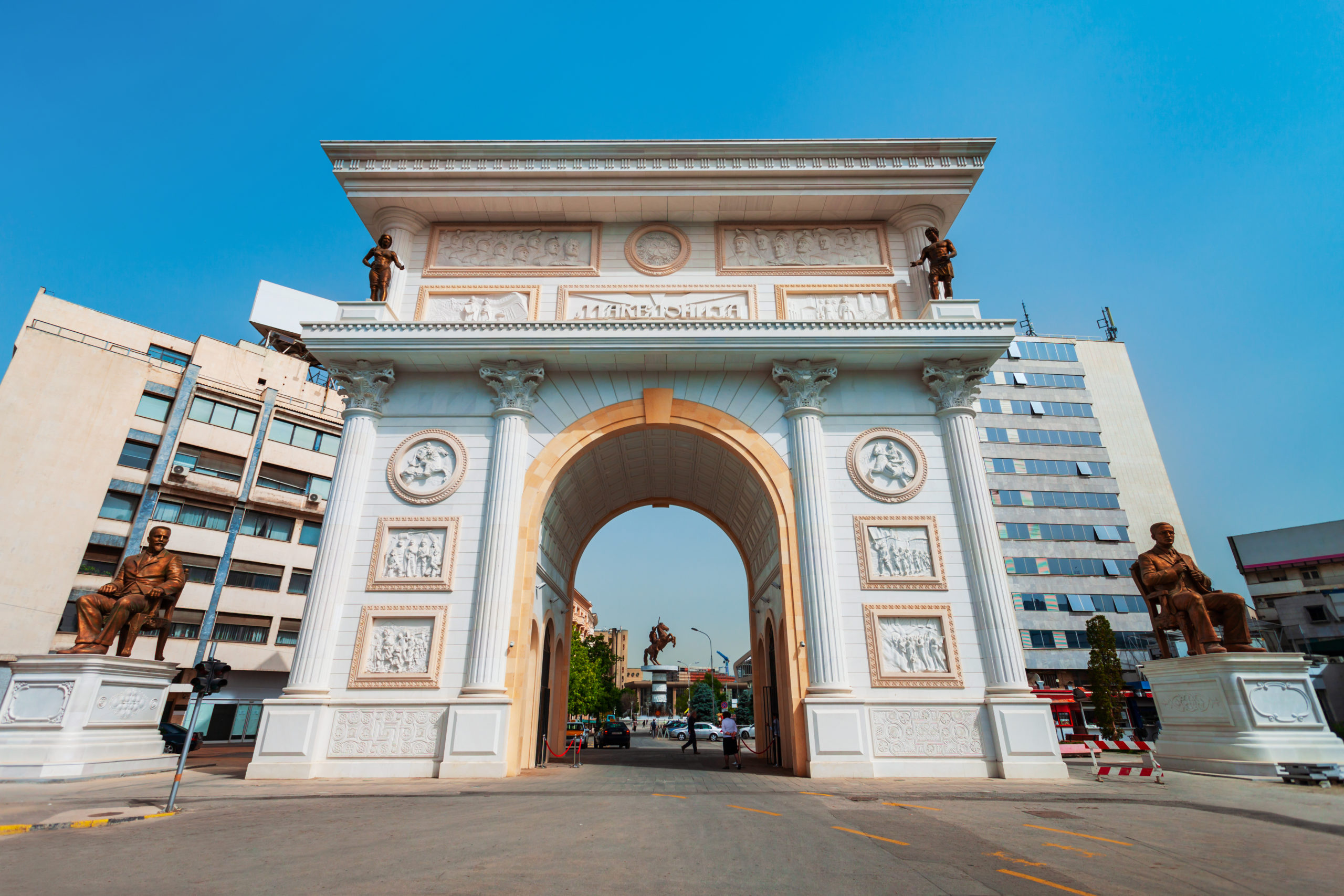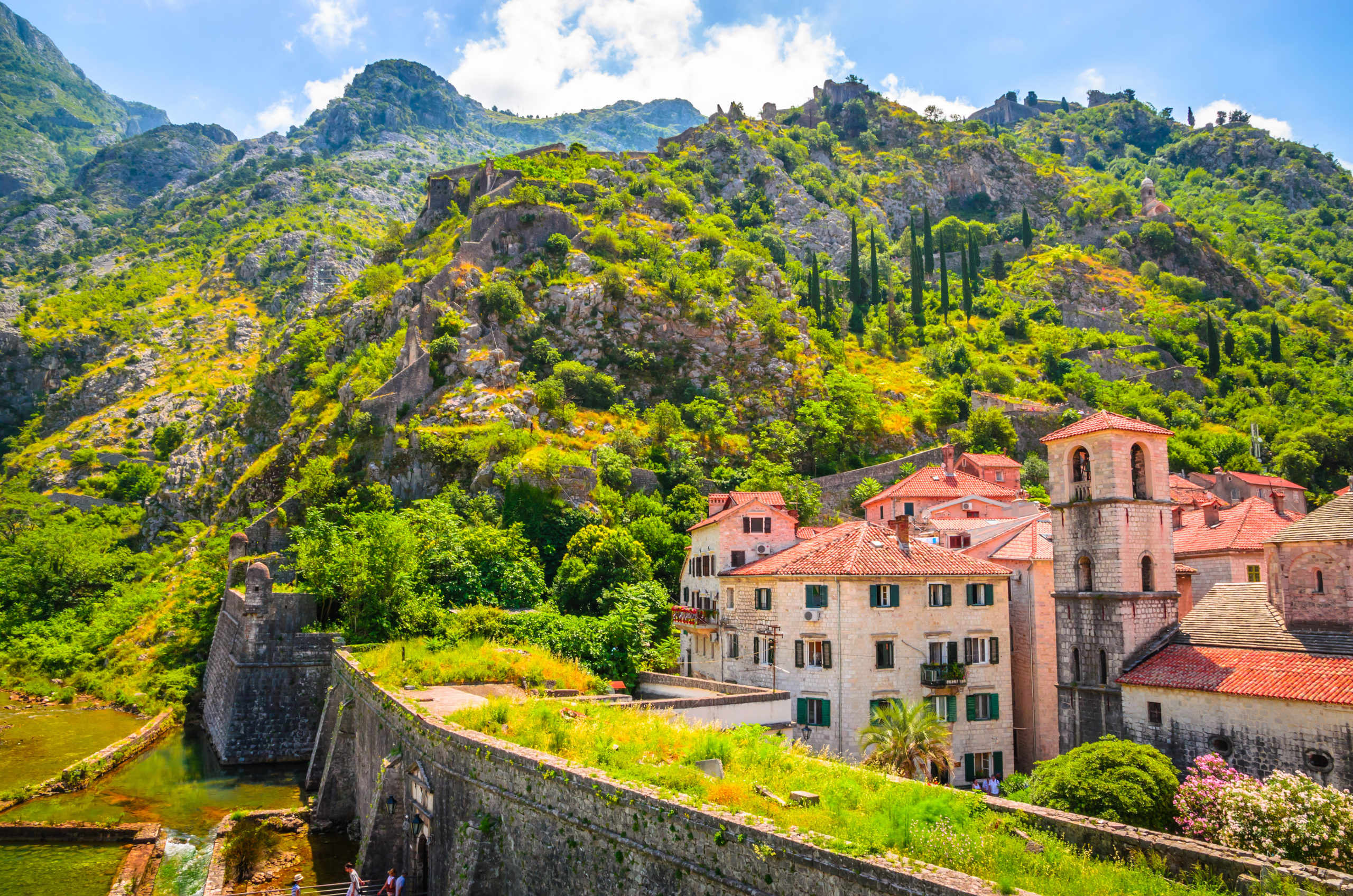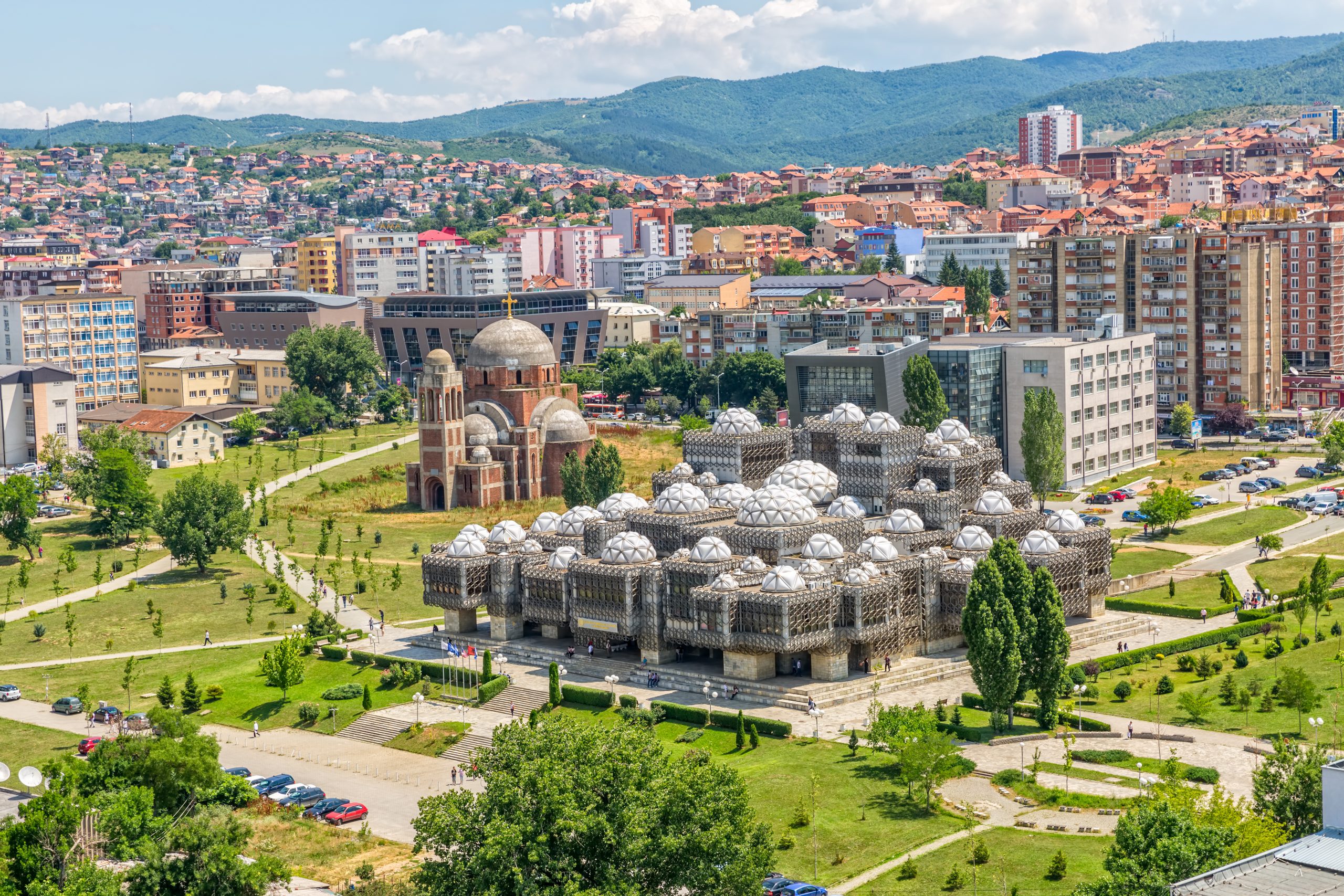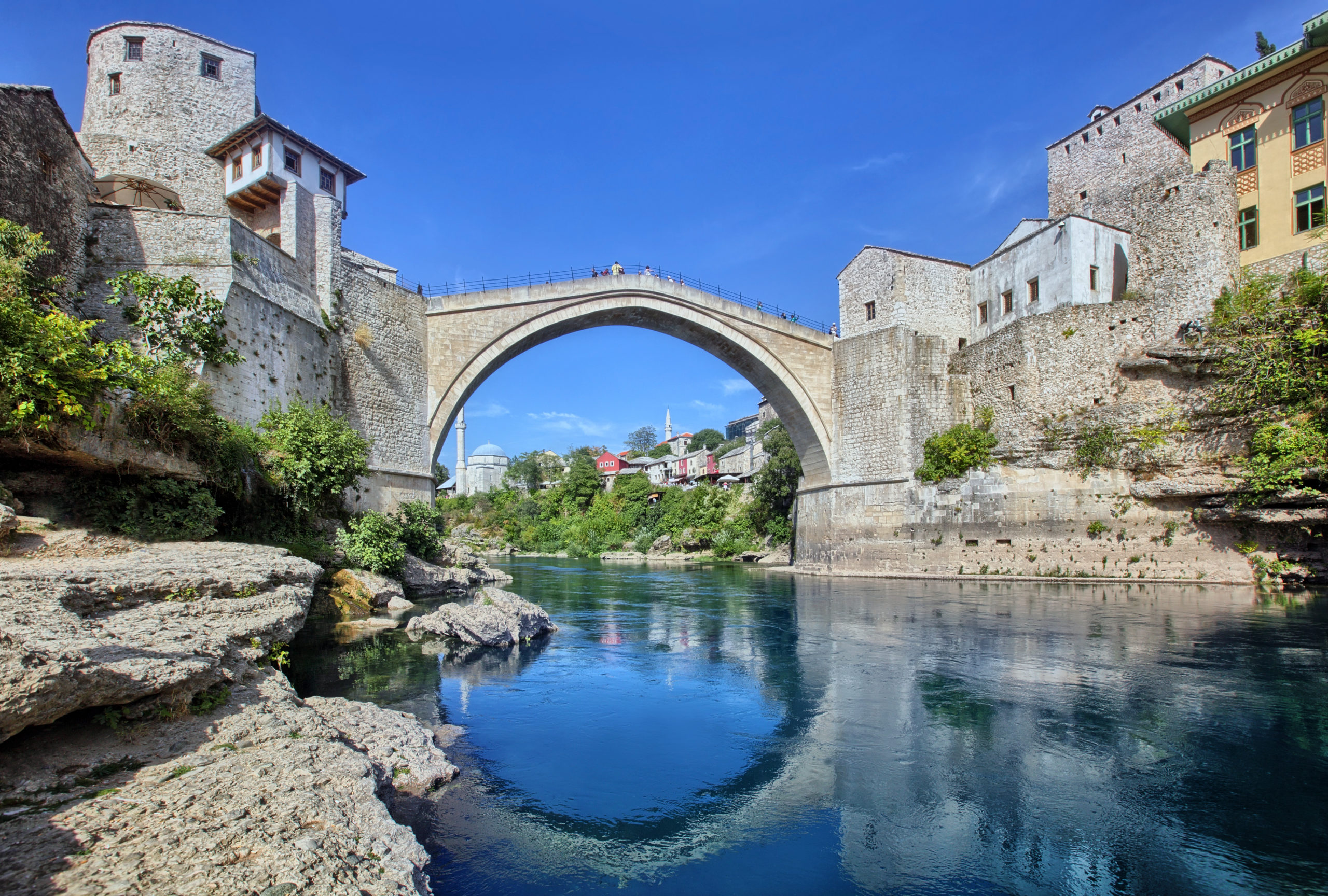Strategic Analysis Balkan Brief
The first half of May 2023
Petra Bošková, Chiara Mihalčatinová, Lýdia Chobotová, Victoria Valová, Štefan Talarovič, Matej Jadroň, Zuzana Šmilňáková, Adam Németh

Skopje, North Macedonia.
Albania
The rift in diplomatic ties between London and Tirana: illegal immigration
Since the United Kingdom and Albania signed the cooperation agreement on December 13, the issue of illegal immigration still stirs up tensions between countries outside the European Union. The exponential rise in the number of Albanians illegally crossing the English Channel on small boats in 2022, when they accounted for approximately a third of all the incoming immigrants, led the Conservative British government to apply stricter rules for asylum seekers.
British Prime Minister Rishi Sunak and Home Secretary Suella Braverman presented the stark decrease in the number of Albanians crossing the Channel during the first three months of 2023 compared to the end of last year as a successful result of the joint arrangement. Due to its status as a candidate country for EU membership, the UK perceives Albania as a “safe, prosperous European country” and therefore makes relentless efforts to repatriate unsuccessful asylum seekers.
Although the respective deal obliged them to form a joint migration task force, Albanian Prime Minister Edi Rama and other leading figures of the Socialist Party’s government accused the British authorities of continued scapegoating Albania for their own internal failures and low approval ratings. In addition, Tirana proposed modifying the visa requirements to help reduce the extent of illegal immigration to the UK.
Generally, Albanian citizens apply through the active visa system due to tourism, business, or study reasons. But the widespread corruption, lack of political stability, deteriorating quality of life, and limited job opportunities force mostly young men to take on a dangerous route through the Channel. Even recruitment campaigns in Albanian on TikTok prove that criminal gangs in northern France find human trafficking extremely profitable. Subsequently, Albanians tend to be forced to participate in the underground economy to pay back their debt. On the other hand, the widespread claims of being victims of modern slavery are used to be rejected by the British government.
Eventually, the private sector initiatives such as support of high-quality remote workers from Albania or small businesses in local tourism and agriculture and government incentives to support returning couples with tax exemptions might provide a way forward from the migration crisis. Until similar alternatives gain momentum, it is going to hang on as a very controversial issue that is exploited not only by human traffickers but also by the leading figures of the political establishment for electoral gains.
Sources:
- BBC News, “Albanian migrants: Why are they coming to the UK and how many have arrived?”, https://www.bbc.com/news/explainers-63473022
- Amelia Gentleman, The Guardian, “Young Albanian men ‘viciously exploited’ after arriving in UK”, https://www.theguardian.com/uk-news/2023/mar/05/young-albanian-men-viciously-exploited-after-arriving-in-uk
- Llazar Semini, Associated Press, “Eager young Albanians risk everything for new future in UK”,https://apnews.com/article/albania-britain-uk-immigration-36bdb3342e9445fe1cf7719921f2f23d
- Alice Taylor, Euractiv, “Albanian PM: UK having a nervous breakdown over immigration”, https://www.euractiv.com/section/politics/news/albanian-pm-uk-having-nervous-breakdown-over-immigration/
Bosnia and Herzegovina
The Federation of Bosnia and Herzegovina’s new government
After Christian Schmindt’s second intervention in just 7 months, the Federation of Bosnia and Herzegovina’s new cabinet was chosen on April 28. The new prime minister, Nermin Nikšić, and his ministers received 51 votes in favour, two votes against them, and one abstention.
The outgoing ministers in the Federation government were appointed in 2015, and they have been serving in a technical mandate since 2018. It was due to numerous political deadlocks related to an insufficient electoral system. Intending to reform the mentioned electoral system, High Representative imposed changes on election night, October 2. These adjustments, however, turned out to be ineffectual since they caused a new political blockade, which was just removed with the help of Schmidt’s Bonn powers.
Schmidt held a press conference on April 27 when he announced: “The Prime Minister, Vice-Presidents and Ministers of the Government of the Federation proposed by the President of the Federation of Bosnia and Herzegovina in the draft decision she signed on March 30, 2023 … are hereby considered appointed.” Furthermore, he imposed constitutional changes by deciding that only one vice president’s signature would be needed to approve a government formation rather than two as previously required. This caused political turmoil amongst FBiH politicians, calling the changes a „brutal attack on constitutional order“ or „suspension of Washington Agreement“.
Despite the expressed disagreements, the new government was agreed upon and created under the leadership of the president of the Social Democratic Party (SDP), Nermin Nikšić, who previously held this position. He will cooperate with 6 more ministers from SDP, 5 from Croatian Democratic Union (HDZ), 2 from Our Party, 2 from Pravda, and the Ministry of Interior will be headed by Ramo Isak, a former member of People’s European Union (NES). The Work Program of the newly appointed government was already announced by Nikšić, containing 49 priority measures for ministries.
Sources:
- Azem Kurtic, BalkanInsight, ,,Bosnia High Representative Breaks Deadlock in Federation Entity – Again”, https://balkaninsight.com/2023/04/28/bosnia-high-representative-breaks-deadlock-in-federation-entity-again/
- SarajevoTimes, ,,Who are the Ministers in the new Convocation of the Government of Federation of BiH?”, https://sarajevotimes.com/who-are-the-ministers-in-the-new-convocation-of-the-government-of-federation-of-bih/
- SarajevoTimes, ,,DF: Imposition of Amendments to FBiH Constitution brutal Attack on constitutional Order”, https://sarajevotimes.com/df-imposition-of-amendments-to-fbih-constitution-brutal-attack-on-constitutional-order/

Kotor, Montenegro. Photo: Shutterstock.com
Croatia
The Illegality of Croatia Forcefully Pushing Migrants Back to Bosnia and Herzegovina
After the years-long path to becoming a full member of the Schengen area, Croatia joined this world’s largest free travel area in January 2023. However, besides the long list of the desired advantages of the Schengen area, Croatia has been facing an exponential increase in the number of migrants entering the country illegally ever since. According to the police, the number of people applying for asylum has increased substantially, with an increase of up to 900% compared to last year. Since Croatia lies on the so-called Balkan route, passing through the country makes it attractive for people on their way to Western Europe, but it seems that Croatia may be breaking international law in their conduct with migrants.
According to a Human Rights Watch (HRW) investigation report, Croatian border guards violently rebuff migrants and deny refugees their right to asylum. Police frequently send migrants and asylum seekers back to Bosnia and Herzegovina, with Afghans accounting for the majority of arrivals, including unaccompanied minors and families. HRW suspects degrading treatment and human rights breaches by Croatian police based on evidence obtained through firsthand statements and records taken from the people that were pushed back. There have been reported cases of the border police regularly stealing or damaging personal goods, including phones, cash, and identification documents. They also frequently subject the migrants to humiliating and degrading treatment, many times in overtly discriminatory ways, with no response from the Croatian authorities regarding the report.
Moreover, people have been allegedly also denied asylum in Croatia after crossing the border, which would mean that the Croatian authorities are not respecting this internationally recognised right. Croatia does not deny that it is returning migrants back to Bosnia and Herzegovina. In their defence, the two countries claim that a bilateral agreement governs these expulsions of hundreds of migrants and refugees. BIH has also stated that it relies on similar treaties with Serbia and Montenegro. However, many experts challenge the legality of this claim since the so-called readmissions through which Croatia attempts to justify its actions are rigid only between EU member states, which BIH is not. Although the EU institutions have pressured Croatia to resolve the situation according to international law, there seem to be no changes in Croatia’s approach to the problem.
Sources:
-
https://balkaninsight.com/2023/05/05/migrants-mass-expulsions-from-croatia-raise-legal-dou bts/
https://www.rferl.org/a/bosnia-croatia-migrants-schengen/32344155.html https://www.arabnews.com/node/2296936/world
https://www.euractiv.com/section/politics/news/number-of-asylum-seekers-soars-in-new-sche ngen-member-croatia/
Kosovo
Serbians boycott elections in northern Kosovo
In Serb-majority municipalities in northern Kosovo, elections were held on April 23, where more than 45 thousand people were eligible to vote. The elections were held after the mass resignation of Serbs from public posts in November 2022. They were first supposed to be held in December, but after ethnic tensions and international community pressure, the elections were postponed.
However, according to the Central Election Commission of Kosovo, only around 1.500 people voted, thus leading to approximately 3% turnout. Serbian president Vučić, who called on Kosovo Serbs to boycott the elections, expressed that “this showed the enormous unity of the Serbian people. They wanted to show that we are here, but we don’t want to participate in your circus” and claimed that only 450 Albanians and 13 Serbs voted in the elections, without proving these claims.
On the other hand, Kosovo PM Kurti claimed that the low election turnout was caused by Belgrade´s intimidation and blackmail and thanked those citizens that voted “for their courage and calmness”. The Serbian List, the largest Serb party in Kosovo, which also boycotted the elections, later communicated, “it is up to us to continue the fight together with our country, Serbia, and with President Aleksandar Vučić to preserve peace and the right of Serbs to live their lives”.
The USA and the European Union both expressed disappointment with the low turnout and the boycott of Serbs. The EU spokesperson, Peter Stano, said, “the EU, together with our partners, has engaged with both sides to reduce tensions and for the Kosovo Serbs to fulfil their obligation from the dialogue and return to the institutions, while for Kosovo, to enable this return to be realised. So far, little progress has been made on this point. It is imperative that we return to the situation in which Kosovo Serbs actively participate in local government, police, and judiciary in northern Kosovo”. Vučić criticised the EU´s position, claiming no elections should have taken place until the establishment of the Association of Serb Municipalities in Kosovo, and expressed doubts that future dialogue with Kosovo will produce no outcomes.
Sources:
- Tamara Milošević Grbić, EURACTIV, “Serbia’s Vucic to head to Brussels after north Kosovo elections”, https://www.euractiv.com/section/politics/news/serbias-vucic-to-head-to-brussels-after-north-kosovo-elections
- Alice Taylor, EURACTIV, “Kurti: Low turnout in north Kosovo vote due to Belgrade blackmail”,https://www.euractiv.com/section/politics/news/kurti-low-turnout-in-north-kosovo-vote-due-to-belgrade-blackmail/
- Alice Taylor & Bojana Zimonjić Jelisavac, EURACTIV, “North Kosovo elections trigger harsh words, criticisms from Belgrade”, https://www.euractiv.com/section/politics/news/north-kosovo-elections-trigger-harsh-words-criticisms-from-belgrade/

Prishtina, Kosovo. Photo: OPIS/ Shutterstock.com
Montenegro
Meagre Resources Leave Montenegro Exposed to Cyber Threats
On August 22, 2022, government servers in Montenegro were attacked by sophisticated cyberattacks. Numerous public entities were hacked, including the websites of the government and the Revenue and Customs Administration. More specifically, 150 computers suffered direct damage. The National Security Council states that information from the attacks “contains a large volume of data important for the improvement of cybersecurity in Montenegro.” Interestingly, some digital services continue to be inoperative eight months after the attacks. The attacks were initially attributed to Russia and then a cybercriminal extortion gang known as Cuba Ransomware. However, despite cooperation with the French National Cybersecurity Agency, ANSSI, and the FBI in the United States, the perpetrator has not yet been identified.
According to experts, Montenegro remains to be just as susceptible to these types of attacks as it was eight months ago. This is due to a lack of governmental cybersecurity personnel but also a lack of investment in cybersecurity. To illustrate, the Computer Incident Response Team, CIRT, a state cybersecurity team, consists of merely seven employees who are responsible for public administration defence. Difficulties in hiring and retaining employees are a result of the salary gap between the public and private sectors. The problem, according to Marko Lakic, an expert from the IT industry, does not lie in the lack of cybersecurity professionals in Montenegro but in that only a few of them work in the public sector, as the government does not have the means to pay as much as private companies.
Experience in the region indicates that such attacks are only increasing in frequency and severity. Thus, it is crucial to “organise security training for all employees in the public administration so that they can acquire basic knowledge about cybersecurity and use it in their daily work”. The director general of the Directorate for Infrastructure, Information Security, Digitization and e-Services in the Ministry of Public Administration, Dusan Polovic, announced that sessions with an emphasis on incident management and risk analysis had already been organised through the EU’s Cyber Rapid Response program.
Lastly, the Agency for Cybersecurity will shortly become a new component of the nation’s cybersecurity architecture. Its establishment should result in a long-lasting system for efficient detection and defence against highly sophisticated cyber threats and incidents, provide more effective and safe operation of the public administration and economy, and promote public trust.
Sources:
- Kajosevič Samir, Balkan Insight, https://balkaninsight.com/2023/05/09/meagre-resources-leave-montenegro-exposed-to-cyber-threats/

Mostar, Bosnia and Herzegovina. Photo: Shutterstock.com
North Macedonia
Strained relations between Bulgaria and North Macedonia
As tensions between the Balkan neighbours continue to simmer over historical and national differences, North Macedonia’s interior ministry announced on May 7 that it had temporarily barred a Bulgarian member of the European Parliament and four others from entering the country because they were “potential violators of public order.”
Minister of Foreign Affairs of Bulgaria Ivan Kondov, on 10.5.2023, said at the press conference that Bulgaria expects the EU candidate country to effectively protect all citizens without distinction. He was referring to North Macedonia and added that: “Instead, we are witnessing attempts to silence the Macedonian Bulgarians’ voices by bringing unfounded allegations against them, pressuring them with lawsuits, demonising them in the media, especially on social media.”
At the press conference, Kondov discussed the relations between Bulgaria and North Macedonia and pointed to the latest developments regarding the attitude of the North Macedonian authorities towards Bulgarian citizens. Kondov also pointed to alleged hate speech and threats against the Bulgarian community in North Macedonia. He also reminded that on May 6, Bulgarian MEP Andrey Kovatchev, who is the Spokesperson of the EPP Group for Enlargement and Southern Neighbourhood, Bulgarian Memory Foundation President Milen Vrabevski, and another three persons were barred from entering the Republic of North Macedonia for a commemoration at a Bulgarian military cemetery near Novo Selo. The border authorities delivered documents to Bulgarian citizens that they are on a blacklist in the Republic of North Macedonia border control system.
The Ministry of Foreign Affairs informs all of Sofia’s partners about this unprecedented act contrary to the declared intention of Skopje to maintain good neighbourly relations and achieve its obligations. Formal letters will be sent to the EU institutions. Kondov emphasised the need for the government of the Republic of North Macedonia to build public support for the inclusion of Bulgarians in the country’s constitution. The lack of public support for guaranteeing equal rights for all citizens points to a serious problem concerning the country’s Integration into the EU. The statements of the Minister of Foreign Affairs of Bulgaria point to the escalation of relations between Bulgaria and North Macedonia in recent months.
The Minister of Foreign Affairs of North Macedonia, Bujar Osmani, responded by arguing that the inclusion of Bulgarians in the constitution would remove the argument that there is discrimination against any community in North Macedonia.
“I don’t want to speculate, but I doubt there is any “deal” between our radicals and their (Bulgarian) radicals to feed each other. For the Bulgarians, the whole campaign – in the EU, in the Council of Europe, through international bodies – is that there is massive State discrimination against them in North Macedonia. They refer primarily to the statements of our opposition, to their views,” Osmani said.
Regarding the denial of entry to North Macedonia by MP Andrej Kovatčev, Osmani said he never felt better than when he said in Sofia that people who provoke and create tension will not be allowed into North Macedonia, which he agreed with prime minister Dimitar Kovačevski.
Sources:
- Radio Free Europe „Евродепутатът Андрей Ковачев не е допуснат в Северна Македония. България осъди случая “, https://www.svobodnaevropa.bg/a/32399739.html
- BULGARIAN NEWS AGENCY, „Osmani: Inclusion of Bulgarians in Constitution Removes Argument There Is Discrimination Against Any Community in North Macedonia“, https://www.bta.bg/en/news/balkans/456613-osmani-inclusion-of-bulgarians-in-constitution-removes-argument-there-is-discri
Serbia
Serbian authorities announced tighter gun control after seventeen people were killed in two mass shootings
Following a decade of no mass shootings, Serbians have witnessed two deadly tragedies in the span of 48 hours in the first week of May. In the aftermath of the horrific events, Serbian President Aleksandar Vučićpromised to “disarm Serbia”, and prominent public figures have been speaking against the country’s culture of violence and war heroes’ glorification.
The first shooting took place on May 3, when a 13-year-old student opened fire on fellow pupils at the Vladislav Ribnikar primary school in Belgrade. The shooter killed eight students and a security guard who wanted to prevent the tragedy by putting himself in the line of fire. The attack was plotted ahead as the shooter carried detailed plans of whom to kill and in which class. Owing to his age, the attacker cannot be placed in prison and, thus, will be held in a psychiatric institution. His parents were arrested on charges of failing to prevent their son from taking the guns out of the safe.
The second shooting unfolded on the next day, May 4 night near the town of Mladenovac, south of Belgrade, where the 21-year-old gunman opened fire at the police officer and his sister and then proceeded to shoot at random people from a moving vehicle with the machine gun. Eight people were killed and fourteen wounded. Arrested on May 5 in the morning in a nearby town of Kragujevac, the shooter wore a T-shirt with neo-Nazi symbols.
The country has the highest level of gun ownership in Europe also because of the war in the 1990s, during which thousands of illegal guns entered the black market. The Serbian Ministry of Interior is in the process of drafting stricter laws aiming at tightening up conditions for obtaining new guns as well as cracking down on illegal gun owners. The authorities want to reduce ownership by 90% thanks to ensuring that everybody who gives up possession of an illegally held gun within a month will be granted an amnesty.
Thousands of demonstrators who protested in Belgrade after the mass shootings view these measures as insufficient and demand the resignation of government officials alongside a cultural overhaul. They criticised Serbian reality shows for showing psychological and physical violence and accused pro-government media of inducing hate towards political dissidents. The union of educators even went on a strike calling for an end to the promotion of violence in Serbia, starting with a ban on media appearances of all convicted criminals.
Sources:
- Jon Henley, The Guardian, “Boy, 13, kills eight children and security guard in Belgrade school shooting”, https://www.theguardian.com/world/2023/may/03/pupil-arrested-after-nine-killed-in-belgrade-school-shooting
- Daniel Boffey and Graham Russell, The Guardian, “Serbia to be ‘disarmed’ after second mass shooting in days, president says”, https://www.theguardian.com/world/2023/may/05/serbia-eight-killed-in-second-mass-shooting-in-days-with-attacker-on-the-run
- Agence France-Presse in Belgrade, The Guardian, “Serbians march in silent protest against gun violence after last week’s shootings”, https://www.theguardian.com/world/2023/may/08/serbians-march-in-silent-protest-against-gun-violence-after-last-weeks-shootings
- Mersiha Gadzo, Al Jazeera, “‘Normalisation of violence’: What led to Serbia mass shootings?”,https://www.aljazeera.com/news/2023/5/7/normalisation-of-violence-what-led-to-serbia-mass-shootings

Contact us